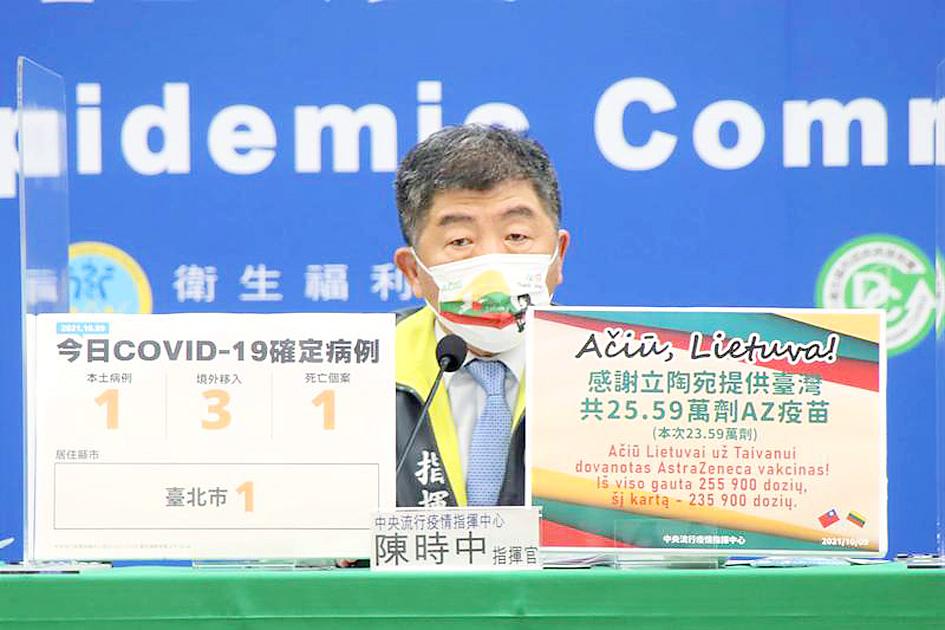The Central Epidemic Command Center (CECC) yesterday reported the first local COVID-19 infection this month, along with three imported cases and one death.
The sole local case, a one-year-old girl in Taipei, tested positive when she was taken to see a doctor on Thursday, after she began experiencing a fever and diarrhea two days earlier, Minister of Health and Welfare Chen Shih-chung (陳時中), who heads the center, told a news conference.
The results showed a cycle threshold value of 38, meaning that the viral load was low and the infection was likely not recent, he said.

Photo courtesy of the CECC
While four people listed as her close contacts have been placed in quarantine, none of her family members have tested positive for COVID-19, he added.
Before yesterday’s new local case, Taiwan had not reported any domestically transmitted cases for nine consecutive days.
The three imported cases involved two people who traveled from the US and one who arrived from Myanmar, the CECC said.
The person who died was a woman in her 70s who was hospitalized in isolation on May 31 after a positive COVID-19 test, the CECC said.
She was diabetic and was transferred to another medical facility for other treatments at the end of August when her COVID-19 symptoms resurfaced, said Centers for Disease Control Deputy Director-General Philip Lo (羅一鈞), who is the deputy head of the CECC’s medical response division.
She was in isolation again until Sept. 17 after tests showed she was not infectious, but she remained hospitalized for her other health issues before she died on Monday due to pneumonia and respiratory failure, Lo said.
Meanwhile, an eighth batch of Moderna COVID-19 vaccines purchased from the US vaccine maker arrived in Taiwan early yesterday, comprising 1.13 million doses.
The batch is to be directed to people who received their first dose of a Moderna vaccine prior to July 16 and need to obtain a second shot to be fully vaccinated, the CECC said on Friday, without revealing how many of those people have yet to receive a second inoculation.
Second-dose shots for those people will be administered starting on Oct. 22, it added.
CECC data as of yesterday showed that approximately 3.45 million people in Taiwan had received their first Moderna shot, including 2.6 million people who received their first shot before mid-July.
As of yesterday, only 1.37 million had been vaccinated with two doses, showing that the country does not have enough vaccines to give a second shot to people vaccinated with the Moderna vaccine.
The WHO has recommended that the two Moderna vaccine doses be given 28 days apart, and the time between the two shots can be delayed by up to 12 weeks if necessary.
The vaccine shipment that arrived yesterday brings the total number of Moderna shots Taiwan has taken delivery of to roughly 6.24 million, of which 3.71 million are part of a 5.05 million-dose order Taiwan placed with the US firm, while 2.53 million were provided by the US and the Czech Republic governments as donations.
Meanwhile, a second batch of AstraZeneca vaccines donated by Lithuania, totaling 235,900 doses, arrived in Taipei yesterday.

Nipah virus infection is to be officially listed as a category 5 notifiable infectious disease in Taiwan in March, while clinical treatment guidelines are being formulated, the Centers for Disease Control (CDC) said yesterday. With Nipah infections being reported in other countries and considering its relatively high fatality rate, the centers on Jan. 16 announced that it would be listed as a notifiable infectious disease to bolster the nation’s systematic early warning system and increase public awareness, the CDC said. Bangladesh reported four fatal cases last year in separate districts, with three linked to raw date palm sap consumption, CDC Epidemic Intelligence

The manufacture of the remaining 28 M1A2T Abrams tanks Taiwan purchased from the US has recently been completed, and they are expected to be delivered within the next one to two months, a source said yesterday. The Ministry of National Defense is arranging cargo ships to transport the tanks to Taiwan as soon as possible, said the source, who is familiar with the matter. The estimated arrival time ranges from late this month to early next month, the source said. The 28 Abrams tanks make up the third and final batch of a total of 108 tanks, valued at about NT$40.5 billion

Two Taiwanese prosecutors were questioned by Chinese security personnel at their hotel during a trip to China’s Henan Province this month, the Mainland Affairs Council (MAC) said yesterday. The officers had personal information on the prosecutors, including “when they were assigned to their posts, their work locations and job titles,” MAC Deputy Minister and spokesman Liang Wen-chieh (梁文傑) said. On top of asking about their agencies and positions, the officers also questioned the prosecutors about the Cross-Strait Joint Crime-Fighting and Judicial Mutual Assistance Agreement, a pact that serves as the framework for Taiwan-China cooperation on combating crime and providing judicial assistance, Liang

A group from the Taiwanese Designers in Australia association yesterday represented Taiwan at the Midsumma Pride March in Melbourne. The march, held in the St. Kilda suburb, is the city’s largest LGBTQIA+ parade and the flagship event of the annual Midsumma Festival. It attracted more than 45,000 spectators who supported the 400 groups and 10,000 marchers that participated this year, the association said. Taiwanese Designers said they organized a team to march for Taiwan this year, joining politicians, government agencies, professionals and community organizations in showing support for LGBTQIA+ people and diverse communities. As the first country in Asia to legalize same-sex